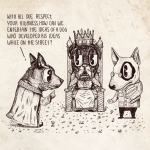The bride’s navel is full of “mixed” or “spiced wine.” Her belly is like a heap of wheat among the lotuses. That is, she is the land of wheat and vineyards, she is the Eucharistic bride who never lacks bread and wine. In loving her, the bridegroom feeds on her. Then we allegorize, and the bride is the church and the lover is Christ and Christ is feeding on the bride’s Eucharistic banquet rather than the opposite. Can we say... Read more




















